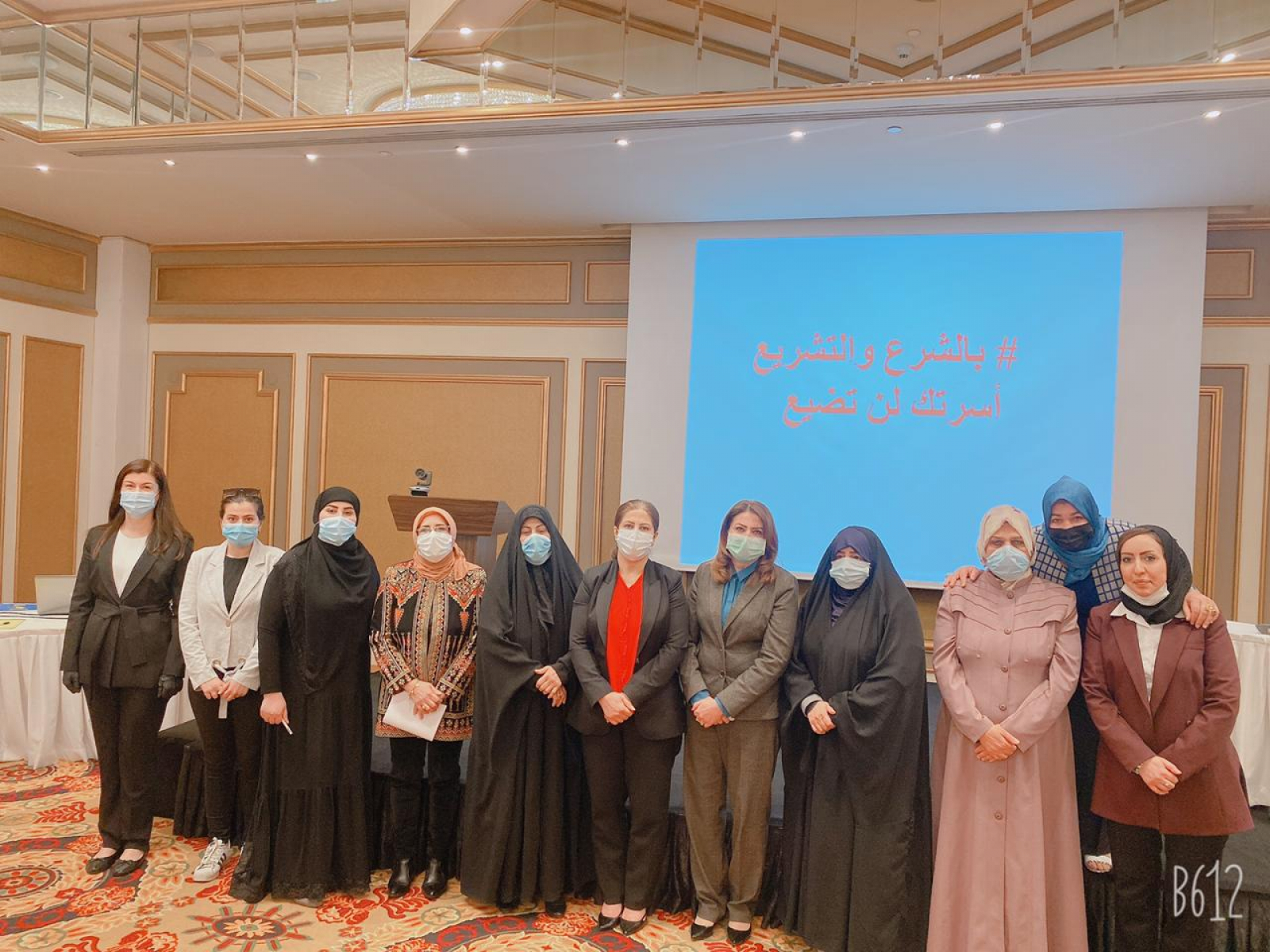
SHARE
Amidst this year’s health crisis caused by the pandemic and the worsening economic situation in Iraq, a group of women members of parliament (MPs) comes together across different political parties, sects, and ethnic backgrounds to address one common cause: combating domestic violence.
With support from the National Democratic Institute (NDI), this group of women MPs developed a strategic plan to advance their advocacy and legislative efforts to combat domestic violence in the country. With the rise of domestic violence in Iraq and globally during the pandemic -- often called a pandemic within a pandemic -- NDI organized a virtual roundtable through its House Democracy Partnership program in June 2020. The virtual session convened women legislators in five countries: Iraq, Lebanon, Morocco, Tunisia, and the United States to share experiences and to discuss legislative responses to the challenges women are facing during COVID-19 in their respective countries.
Building on this engagement, NDI launched a series of discussion groups and strategy sessions with the MPs to further support their efforts. During the most recent event in November 2020, the parliamentarians virtually met with their peers from Jordan, Morocco, Tunisia, and Iraqi-Kurdistan to share experiences and discuss their internal strengths and challenges. Civil society activists from Tunisia also attend the discussion to share insights and brainstorm how civil society can play a role in mobilizing public support around the legislation. By the conclusion of the event and after months of planning and information gathering, the MPs officially launched their advocacy campaign under the slogan, “Through Shari’a and legislation, you won’t lose your family.” بالشرع والتشريع أسرتك لن تضيع
While this legislation is welcomed by many in Iraq, others consider the initiative as a threat to the family. As one participating MPs said, “Generally, women activists in domestic violence are accused by society of dividing families. There are provisions in the law that create a controversy.” One of the main challenges the women MPs will face when trying to pass the legislation will be the reluctance of political parties, as well as opposition from religious and community leaders.
To ease the implementation of the bill and prevent a social backlash, the women MPs will focus their efforts on building alliances with stakeholders outside of the parliament, particularly in the media, religious clerics, and religious and community leaders. During a consultation session with their Tunisian counterparts, one MP pointed out that although the religious context seems daunting, when they met with religious leaders to share the draft legislation, the leaders noted that they were in support of the legislation, and in fact, “Had the similar views as activists in regards to protecting women and families against domestic abuse.”
The MPs, who come from different religious backgrounds and political parties, agreed to set aside their ideological differences to work on this common cause -- a cause that has been fought by activists and women legislators in Iraq for decades. As one of the participants said, “Despite our political and ethnic differences, we need to work together until we vote for the bill.” Together, they will consolidate their efforts, put their political affiliation aside, and reach out to the most influential players to get their buy-in and build support for the domestic violence law.
This program is implemented with funding from the U.S. Department of State’s Bureau of Democracy, Human Rights, and Labor.
===============
في خضم الأزمة الصحية الناجمة عن الوباء لهذا العام والوضع الاقتصادي المتدهور في العراق، تجتمع مجموعة من البرلمانيات من مختلف الأحزاب السياسية والطوائف والخلفيات العرقية لمعالجة قضية مشتركة ألا وهي مناهضة العنف الأسري.
قامت هذه المجموعة من البرلمانيات وبدعم من المعهد الديمقراطي الوطني (NDI)، بإعداد خطة إستراتيجية لتعزيز جهودهن التشريعية لمناهضة العنف الأسري في البلاد. مع تصاعد العنف الأسري في العراق والعالم أثناء انتشار الوباء (غالبًا ما يُطلق عليه اسم جائحة داخل جائحة)، نظم المعهد الديمقراطي الوطني مائدة مستديرة افتراضية في حزيران/يونيو 2020 من خلال برنامج الديمقراطية التشاركية في الكونغرس الأمريكي. وقد جمعت الجلسة الإفتراضية المشرعات من خمس دول: العراق، لبنان، المغرب، تونس، والولايات المتحدة لتبادل الخبرات ومناقشة الاستجابات التشريعية للتحديات التي تواجهها المرأة خلال جائحة كورونا في بلدانهم.
بناءً على هذه المشاركة، أطلق المعهد الديمقراطي الوطني سلسلة من المجاميع النقاشية والجلسات الاستراتيجية مع النواب لدعم جهودهم بشكل أكبر. خلال الورشة الأخيرة في نوفمبر 2020، التقى البرلمانيات افتراضياً مع اقرانهم من الأردن والمغرب وتونس وكردستان العراق لتبادل الخبرات ومناقشة نقاط القوة والتحديات الداخلية لديهن. كما حضرت ناشطات المجتمع المدني من تونس لمناقشة وتبادل الأفكار حول تقوية دور المجتمع المدني في حشد الدعم العام حول التشريع. في ختام الحدث وبعد أشهر من التخطيط وجمع المعلومات، أطلق النواب رسمياً حملتهم الدعوية تحت شعار "بالشرع والتشريع أسرتك لن تضيع".
على الرغم من ترحيب الكثيرين لهذا التشريع في العراق، يعتبر آخرون المبادرة تهديدًا للأسرة. وكما قالت إحدى البرلمانيات المشاركات، "بشكل عام، يتهم المجتمع الناشطات في العنف الأسري بتقسيم الأسر. هناك أحكام في القانون تثير الجدل" .إحدى التحديات الرئيسية التي ستواجه البرلمانيات عند المحاولة بتمرير التشريع هو ممانعة الأحزاب السياسية، وكذلك المعارضة من قبل القيادات الدينية والمجتمعية.
لتسهيل تنفيذ القانون ومنع رد فعل اجتماعي عنيف، ستركز النائبات جهودهن على بناء تحالفات مع أصحاب المصلحة خارج البرلمان، لا سيما في وسائل الإعلام ورجال الدين والقادة الدينيين والمجتمعيين. خلال جلسة تشاور مع نظرائهم التونسيين، أشارت إحدى النائبات إلى أنه على الرغم من أن السياق الديني يبدو شاقاََ، عندما التقوا بزعماء دينيين لتبادل الآراء حول مشروع القانون، أشار القادة إلى أنهم كانوا يدعمون التشريع، وفي الواقع، كانت لها وجهات نظر مماثلة كناشطين فيما يتعلق بحماية النساء والأسر من العنف المنزلي".
وافق النواب الذين ينتمون إلى خلفيات دينية وأحزاب سياسية مختلفة، على تنحية خلافاتهم الأيديولوجية جانباً للعمل على هذه القضية المشتركة، وهي القضية التي حارب من اجلها الناشطون والمشرعات في العراق منذ عقود. كما قالت إحدى المشاركات، "على الرغم من اختلافاتنا السياسية والعرقية، نحتاج إلى العمل معًا حتى نصوت لصالح مشروع القانون". سوف يعملن معًا على توحيد جهودهن، ووضع انتماءاتهن السياسية جانبًا، والتواصل مع اللاعبين الأكثر نفوذاً للحصول على تأييدهم وبناء الدعم لمشروع قانون مناهضة العنف الأسري.


